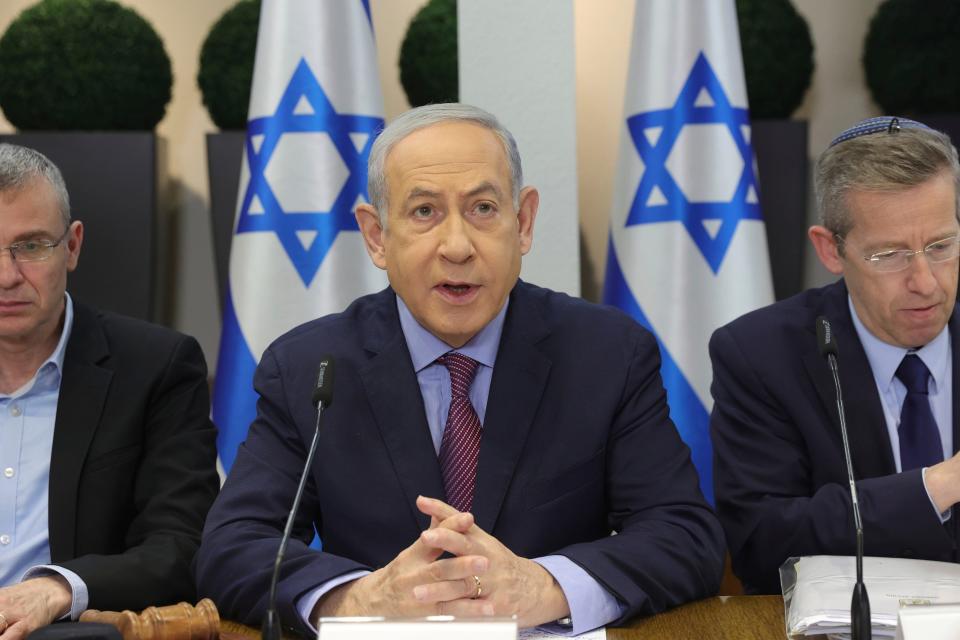Joe Biden, Benjamin Netanyahu speak for first time in a month as tensions rise over Gaza war
WASHINGTON – President Joe Biden spoke Monday with Israeli Prime Minister Benjamin Netanyahu for the first time in a month amid rising tensions between the two leaders over how Israel has conducted its war with Hamas.
White House National Security Adviser Jake Sullivan described the call as “very business-like” and said the two leaders discussed the latest developments in Israel and Gaza, including Netanyahu’s plans for a military campaign in Rafah and efforts to distribute humanitarian aid to Palestinians amid reports of widespread hunger and disease.
“Each of them recognize that we are at a critical moment in this conflict,” Sullivan said. “They share a common objective that is for Israel to prevail over Hamas, and they have a different perspective on this operation.”
Biden asked Netanyahu to send a team of Israeli military, intelligence and humanitarian officials to Washington in the coming days to hear U.S. concerns about Israel’s plans for a military campaign in Rafah and for an alternative proposal that would target Hamas and secure the Egypt-Israel border without a major ground invasion, Sullivan said.
Netanyahu agreed to the request, Sullivan said.
The conversation marked the first time the two leaders have spoken since Biden was caught on a hot mic after his State of the Union address saying he needed to have a "come to Jesus meeting" with the Israeli leader. Sullivan declined to comment when asked if the phone call was the meeting Biden was referencing.
“I’ll let you draw your own conclusions,” he said.
The call was also the first conversation between Biden and Netanyahu since Senate Majority Leader Chuck Schumer, a New York Democrat who is the highest-ranking Jewish official in U.S. history, called for Israel to hold new elections to replace Netanyahu.
Schumer, who is close ally of Biden, said from the Senate floor last Thursday that Netanyahu has become an obstacle to peace in the Middle East and has “lost his way” by putting his political survival ahead of the best interests of Israel.
'He has to change': For the first time since Israel-Hamas war broke out, President Biden and Netanyahu are at odds

Biden praised Schumer’s remarks on Friday as “a good speech.” The White House said later that Biden was not calling for new elections or for Netanyahu to be replaced.
“That’s going to be up for the Israeli people to decide,” said John Kirby, the White House spokesman for national security issues.
Netanyahu said Sunday that Schumer's calls for a new election were "totally inappropriate" and accused the Democratic leader of treating Israel like a “banana republic.”
“That’s something that Israel, the Israeli public, does on its own,” he said during an interview on CNN's "State of the Union."
Biden and Bibi: President on hot mic says he needs a 'come to Jesus' meeting with Netanyahu
The Biden administration has become increasingly at odds with Netanyahu over Israel's refusal to scale back the war in Gaza and its efforts to get humanitarian aid to Palestinian civilians. Biden has faced increasing pressure from progressives and Arab Americans for his unwavering support of Israel in the months since the Oct. 7 Hamas attack on Israel.
Netanyahu has refused Biden's demand for a two-state solution to the Middle East crisis and has pledged to continue the war in Gaza until Hamas is crushed.
One of the biggest flashpoints between the two leaders is the fate of the Rafah, located on Gaza's 7.5-mile border with Egypt ? which is the only crossing that isn't controlled by Israel.
Netanyahu said Sunday he plans to press ahead with a military campaign against Rafah even though the United States and other Israeli allies have urged him not to attack the city in the southern Gaza Strip.
In their conversation Monday, Biden spoke at length about his concerns about the prospect of an Israeli military operation in Rafah, Sullivan said.
More than 1 million Palestinians displaced by the war have fled to Rafah, and there is nowhere else for them to go because Gaza’s other major cities have largely been destroyed, Sullivan said. Israel has not presented a plan for how it would safely move those citizens, let alone feed and house them and ensure they have access to basic things like sanitation, Sullivan said.
Rafah is also a primary entry point for humanitarian assistance into Gaza from Egypt and from Israel. An invasion would shut down that effort or at least put it at grave risk at the moment it is most sorely needed, Sullivan said.
Contributing: Joey Garrison
Michael Collins covers the White House. Follow him on X, formerly Twitter, @mcollinsNEWS.
This article originally appeared on USA TODAY: Biden, Netanyahu speak amid rising tensions over Israel-Hamas war
